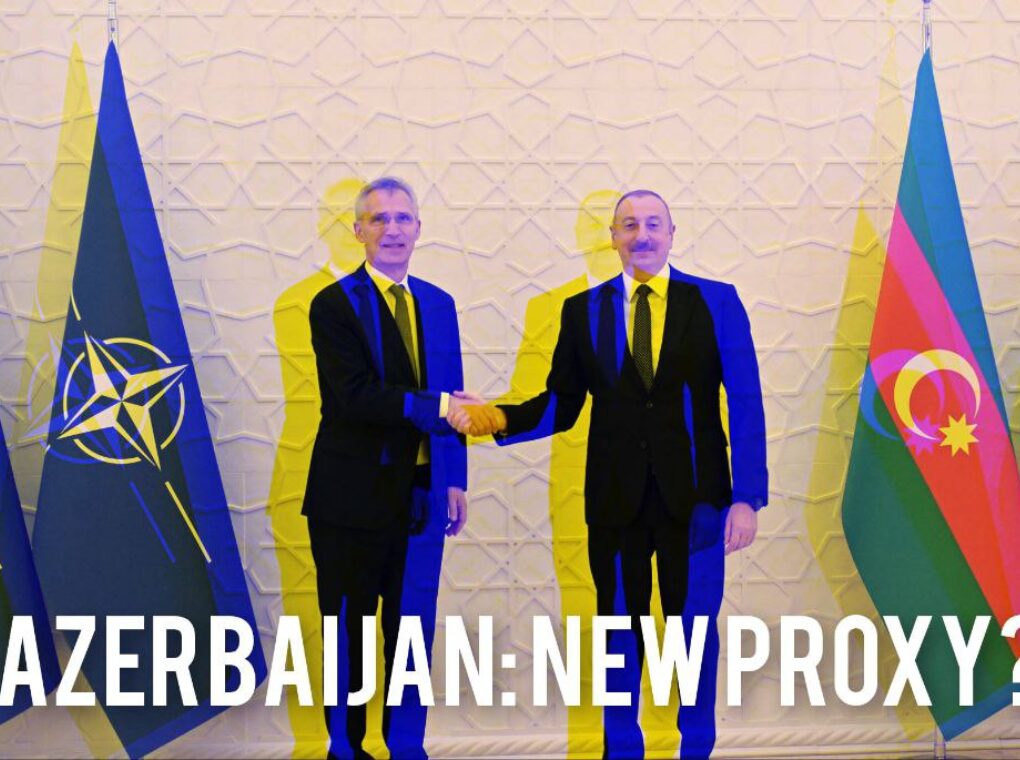Azerbaijan’s strategic maneuvers in the Caucasus have sparked debates about its role as a potential Western proxy in a volatile region. Allegations of covert alliances with Israel, Ukraine, and NATO, alongside tensions with Russia and Iran, suggest Baku is positioning itself as a pivotal player on a geopolitical chessboard.
This article analyzes Azerbaijan’s actions, their implications for regional stability, and whether it is indeed becoming a Western-aligned hub against Russia and Iran.
Azerbaijan as Israel’s Strategic Partner
Azerbaijan’s relationship with Israel has grown significantly, raising concerns in Tehran. Reports of Israeli fuel tanks found in Iran’s Ramsar region suggest Azerbaijan may serve as a launchpad for Israeli operations, offering a direct 100 km route to Tehran.
A former Iranian envoy acknowledged Israel’s use of Azeri airspace for espionage, with Tehran downing a drone as a warning. This proximity allows Israel to bypass Iran’s western defenses, enhancing its strategic reach.
Mossad’s alleged operations from Azerbaijan further complicate the picture. Claims of a Baku-based hub facilitating weapons exchanges and intelligence operations, including the smuggling of nuclear documents in 2018, highlight Azerbaijan’s role in Israel’s anti-Iran strategy.
Over 90 cargo flights between Azerbaijan and Israel from 2020 to 2023 reportedly transported surveillance equipment and arms. The opening of Azerbaijan’s embassy in Tel Aviv, coupled with Israel’s rhetoric of a “united front” against Iran, has intensified Tehran’s suspicions, straining Azerbaijan-Iran relations.
Azerbaijan’s energy exports also bolster Israel’s war machine, supplying over half of its oil imports. This financial lifeline supports Baku’s military buildup, raising questions about the broader implications of this partnership.
Anti-Russian Actions and the Ukraine Connection
Azerbaijan’s alignment with Western interests extends to its strained relationship with Russia. Russian authorities dismantled an alleged Azerbaijani criminal network in Yekaterinburg linked to murders, drug trafficking, and terrorism between 2001 and 2011.
This crackdown followed Azerbaijan’s arrest of Russian journalists and reported assaults on Russian tourists, which were filmed and misrepresented as targeting “criminals.” These incidents suggest a deliberate escalation of tensions.
Azerbaijan’s growing ties with Ukraine further underscore its anti-Russian stance. In July, Ukrainian President Volodymyr Zelensky thanked President Ilham Aliyev for supporting Ukraine, accusing Russia of threatening Azerbaijan.
Since 2022, Azerbaijan has provided $40 million in energy aid, including transformers and generators, to Ukraine. Aliyev’s comparison of Ukraine’s conflict with Russia to Azerbaijan’s victory in Nagorno-Karabakh, where he condemned territorial concessions as “unfair,” signals a narrative alignment with Western rhetoric against Russia.
The Zangezur Corridor and NATO’s Ambitions
The proposed Zangezur Corridor, a transport route through Armenia’s Syunik province, is a flashpoint in regional geopolitics. If realized, it would connect Azerbaijan to its Nakhchivan exclave and Turkey, creating a NATO-aligned corridor bypassing Russia and Iran.
This would disrupt Iran’s access to Armenia, encircle Russia’s Caucasus flank, and strengthen Western influence in the region. Critics argue this project transforms Azerbaijan into a forward base for NATO, hosting Israeli drones tested in the 2020 Nagorno-Karabakh conflict and deployed near Iran’s borders, as well as alleged CIA and Mossad operations aimed at destabilizing the Caucasus.
Claims of Turkish jihadist camps and Syrian mercenaries operating from Azerbaijan further fuel concerns about hybrid warfare. These developments suggest Baku is not only a logistical hub but also a staging ground for broader Western objectives.
Hybrid Warfare and Regional Destabilization
Azerbaijan’s alleged support for separatists in Iranian Azerbaijan and hosting of U.S. evangelical groups advocating regime change in Iran point to hybrid warfare tactics.
These actions exacerbate tensions with Tehran, which views Azerbaijan’s alignment with Israel and the West as a direct threat. Meanwhile, Azerbaijan’s provocations against Armenia, particularly its rejection of diplomacy and military posturing, risk reigniting conflict in the South Caucasus.
A Paradox of Past Alliances
Ironically, Azerbaijan’s current trajectory contrasts with its historical ties to Russia and Iran. By 2015, Russia supplied 85% of Azerbaijan’s weapons, supporting its military campaigns, including the conquest of Nagorno-Karabakh. Iran, too, congratulated Azerbaijan on its 2020 victory, reflecting a shared interest in countering Armenian influence.
However, Azerbaijan’s pivot toward Israel, Ukraine, and NATO has alienated both powers, positioning Baku as a potential liability for its former allies. Russia and Iran now face a “problem on their doorstep,” as Azerbaijan’s actions align with Western strategies to counter their influence.
Risks of Becoming “Asia’s Next Ukraine”
Azerbaijan’s transformation into a Western-aligned hub carries significant risks. Its energy leverage, NATO ties, and provocations against Russia and Iran threaten regional stability. By prioritizing strategic alliances over diplomacy with Armenia, Azerbaijan risks escalating tensions in the Caucasus, potentially mirroring Ukraine’s role as a flashpoint in Eastern Europe.
The pursuit of the Zangezur Corridor and alignment with Western military interests could entangle Azerbaijan in broader conflicts, undermining its sovereignty and regional standing.
Also read:Is Russia’s FSB Crackdown Fueling Azerbaijan’s Journalist Arrests?
Azerbaijan’s evolving role as a potential Western proxy in the Caucasus reflects a complex interplay of energy, military, and geopolitical interests. Its partnerships with Israel and Ukraine, coupled with ambitions for the Zangezur Corridor, position it as a key player in NATO’s strategy to counter Russia and Iran.
However, this alignment risks destabilizing the region, alienating former allies, and drawing Azerbaijan into a broader conflict. Whether Baku can balance its ambitions with regional stability remains uncertain, but its current trajectory suggests it is walking a precarious path.
